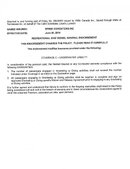Because of where AI am and what I do, I carry an in-water liability policy. It's the expensive part of my insurance suite of policies at $25k per year. My entire policy including 2 facilities, one in Key West and one in Lakewood, CO is $35k, so it is by far the most expensive part. The insurance company requires that I see a cert card for the level of dive I am offering. If it's a 130' single tank numpty dive, I can see an OW card. If a trip where a deco gas is allowed/proper, than an Advanced Nitrox card. And if trimix, than the appropriate trimix card, rebreather card, etc.
Folks who get hurt while diving from my boat tend not to stand in the witness box, they tend to send their surviving heirs instead. As long as I meet the requirements of the insurance company (properly filled out waiver and verification of certification card), they will spend up to a million bucks defending me. So, yes, I don't care if they stand in the witness bos and say "Captain Wookie said I was properly certified to conduct the dive". As we all know, capability doesn't really enter into it.




